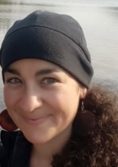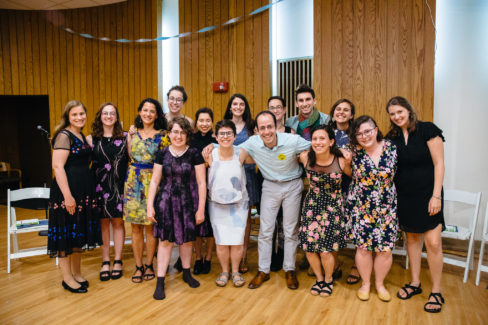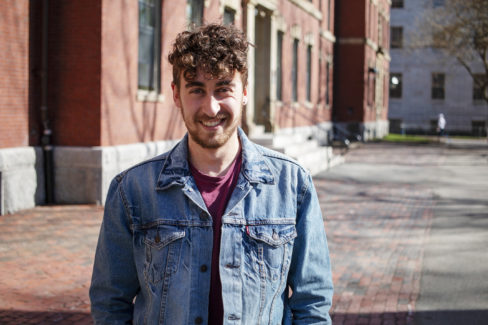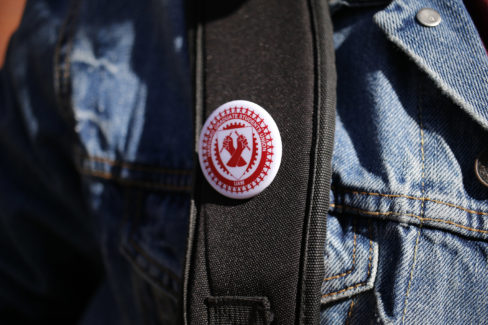by Rachel Plattus

Rachel Plattus, JOIN Jewish Organizing Fellow ’17-18
May Day is International Workers’ Day – a day of solidarity and resistance. In Puerto Rico, thousands of community members took to the street united against cuts to retirement benefits, rollbacks of labor laws, school closures, and pitifully inadequate hurricane recovery efforts, more than seven months after Hurricane Maria tore across the island. In response, colonial government police used tear gas on the crowds, including many children who have just lost their access to public education.
May Day is an ancient festival of fertility and springtime. May from the Greek and Roman goddess Maia, one of the Pleiades Seven Sisters, an earth goddess whose spring warmth urges the plants to sprout and grow, even after four April Nor’Easters! Maia lived alone in the caves outside of town, and mythologies describe her alternately as “shy” and “solitary,” though never “lonely.”
Mayday is a maritime distress signal, from the French “m’aider” – help me. The signal is to be used only when people or craft are in immediate danger, repeated three times. Help me, help me, help me. So we know you mean it.
Growing up, the weaving of many colored ribbons around a maypole was a rite of passage, 8 and 9-year-olds at my elementary school wearing flower wreaths and uncomfortable dress-up clothes skipping around the pole to old English music. Did our teachers—so many of whom are my age, now—laugh about the fact that these kids were skipping around what is widely said to be a phallic symbol of fertility?
May Day is so full of possibility for teachable moments. May Day could have been for marching, for stepping outside of our mostly wealthy, white bubble and into the infinite complexities and possibilities of solidarity. It could have been for nurturing the seeds, for putting hands in the soil. It could have been for learning the difference between solitude and loneliness. We could have learned to say “help me.”
It’s so much harder to learn to say “help me” now.
And we need so much more help.
This year in JOIN has created many teachable moments, some expected, most not. And the one that is sitting with me now is that—almost wherever we started—the world for which our educations were meant to prepare us doesn’t exist anymore, and that the disconnect between worlds is actually killing us.
I learned early that civic engagement was a little bit about “community service” and a lot about voting. I was an eager participant, first in paternalistic, tokenizing service work that perpetuated assumptions about class, race, and who gets to decide what will meet a community’s needs—and later, in years of electoral organizing which while more structurally grounded in representation and voice, lacked a true analysis of the systems that stood in the way of self-determination.
Even later, I stumbled into protest politics, into resistance against the systems of domination that set the terms of our economy, our government, our culture. Into recognition of the ways in which those systems are upheld by force (war machines, police, prisons) and by my own consent. I learned what it could mean to withdraw that consent, individually and collectively, that solidarity makes our collectives powerful enough to pull down the pillars that hold up the systems. I learned a little bit about how to ask for help, a little bit about how to say “no,” and the barest hints of what it might mean to say “yes” to other ways of being in the world together.
Since then, I’ve been on a messy journey of learning how to interrupt systems of domination, maintained by violence, by saying “yes” to systems of interdependence, maintained by love, in public and private. In fighting for community, for participatory governance, for the expansion of the commons, for solidarity economies, for reparations and restoration that acknowledge and take action toward healing the violent seizure of land and life from black and indigenous peoples all over the world.
My circuitous path from service, to electoral politics, to protest politics, to popular education has been a deeply joyful and deeply painful peeling back of masks, some of which (whiteness, wealth, woman-ness) I’ve worn since birth. Others, like the one that says “I’ve got this, all by myself,” I’ve constructed.
We, none of us, have got this, all by ourselves.
I keep learning from my own organizing praxis in popular education about how many of our answers live in our bodies and our communities, and what it looks like to peel back the masks and make those knowledges visible. Part of this peeling back for me has been an uncovering of my Jewishness, of my family’s migration story and the stories and worlds left behind to make way for a life in the capitalist, white supremacist, heteropatriarchal world in which we were taught to measure our success.
In JOIN, and in the spaces opened up for me by my experience in JOIN, it has been a peeling back of stories of isolation and self-sufficiency to make way for authentic solidarity and real community.
I’ve been in circle with our JOIN cohort, digging deep into who we are and could be as organizers, what our Jewishness has given us and what it has taken away, what right action and emergent strategy and accountable leadership look like in the world we’re living into. We’ve learned together about how the institutions within which we organize hold the contradictions of dependence on philanthropy, violent forms of hierarchy, and an aversion to hard conversations with the deep desire to support communities where everyone is valued, everyone has what they need, and hard conversations about race, gender, class, and Palestine are an opening to transformative action. We’re learning hard lessons about sickness and healing and how to be okay in this complex and contradictory world, lessons that play out not just in our work but in our families, our communities, and our spiritual lives. About the support and healing that are available when we call “mayday, mayday, help me” into a circle of love and trust.
I’ve been in circle with an intergenerational group of Jews making personal and collective meaning of old Jewish teachings in our contemporary reality. I’ve felt space made in our bodies and our brains and our hearts for these teachings, brought to life by community, to form a taproot for right action.
I’ve been in circle facilitating workshops with leaders from across the country as we surface what we already know about our communities’ path to self-determination, and expand our imaginations about possible paths to get there.
I’ve been in circle with graduate students seeking a deeper “why” for their scholarship and with meditators seeking sangha from which to more deeply understand their roles in interrupting and dismantling white supremacy to make room for beloved community. I’m writing this from a gathering where I am in circle with dozens of young leaders working and fighting and loving for a livable future for their communities in the face of catastrophic climate change, grieving what is already lost and strategizing about what can still be saved.
Recently, I’ve been in circle with a community of sisters and seekers, “Nuns and Nones,” who are wrestling with how to create systems of mutuality and support to steward centuries-old institutions of radical hospitality and transformative social action into the present and future world while offering young leaders the soul care, connection, and elder wisdom they yearn for in an age of social isolation and deep economic, environmental, and cultural instability.
The sisters speak about “hospitality” as a driving force for their work to provide education for school aged children and the formerly incarcerated, to house and accompany immigrants, refugees and asylees, to pass the Affordable Care Act, to support communities on the frontlines of climate chaos to access government funds for rebuilding in their communities.
Hospitality isn’t a lens through which I typically understand my work, but if we consider that we’re all guests of this land (and most of us beneficiaries of its violent seizure and enclosure from its long-term stewards), it is worth thinking about the radical hospitality extended to us by the land underneath our feet and all of the beings who have called that land home—and what we’ve done with that gift. I learned from the sisters that radical hospitality is reciprocal, and that at its root it is about a willingness to be transformed by one another. These women have been warriors in the fight for a better world for decades, and still they find room to be genuinely amazed by the young people trying to fight alongside them. This openness to transformation, to adaptation to the needs of the time, has allowed the sisters to sustain their communities for hundreds of years, even as the church that they serve erases their role in its formation and questions their faithfulness.
We change each other, and in the process we change the world. That part is inevitable.
There is another interpretation of the symbolism of the Maypole as the sacred tree of the world, the world axis. A sort of tin can telephone between earth and sky, a liminal space where the boundaries blur between the mortal and the sacred and messages are easily received in both directions.
And there is eight-year-old me, skipping in time in the collective project of adorning this symbol. There is eighteen-year-old me, wanting so badly to believe that stepping into my power is as simple as giving or getting votes. And there is twenty-eight-year-old me, wrestling with how our displacement and disconnection from our roots, Jewish and otherwise, have made us incapable of asking for and receiving the help we need in a world where interdependence is literally the only thing that can save us.
Rachel Plattus, JOIN Jewish Organizing Fellow ’17-18, is the Co-Editor of Beautiful Solutions, a web platform, book, and grassroots popular education program designed to support people to imagine—and create—a democratic, just and sustainable future.










